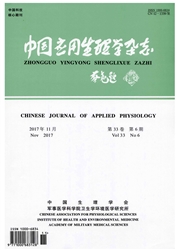

 中文摘要:
中文摘要:
目的:探讨力竭过程中丘脑底核(SIN)对皮层兴奋性的调控作用。方法:采用皮层脑电(ECoG)及局部场电(LFPs)同步记录技术,对一次性力竭运动过程中大鼠SIN、皮层神经元电活动变化规律进行同步、动态观察。结果:运动开始阶段大鼠能够自主跟随跑台进行运动,运动持续约45min时(45±11.5min),自我驱动下的运动能力明显降低;此时STN兴奋性显著增加(P〈0.01),皮层兴奋性显著下降(P〈0.01)。如果给予大鼠一定的外部刺激后仍可继续运动一段时间直至力竭;力竭即刻皮层兴奋性降到最低值(P〈0.01),而SIN兴奋性变化不显著(P〉0.05)。结论:大鼠在力竭运动过程中,皮层运动区神经元电活动随着运动疲劳的发生呈现广泛的抑制现象,而SIN神经元电活动在疲劳初期则明显增强,SIN通过负诱导作用参与了运动性中枢疲劳的调控,且STN神经元兴奋性增强可能是皮层实现保护性抑制机制的重要途径之一。
 英文摘要:
英文摘要:
Objective: To observe the modulatory effect of subthalamic nucleus (SIN) on activity of motor cortex during exhausting exercise. Methods: Electrocorticogram (ECoG) and local field potentials (LFPs) recording techniques were applied simultaneously to observe the dynamic changes of oscillations in seusorimotor area and STN of rat during exhausting exercise. Results: Rats ran well initiatively with treadmill at the beginning of the exercise, about 45 min(45 ± 11.5)later, movement capacity reduced. Corresponding electrical property showed that STN activity increased significantly while activity of cortex decreased significantly. Subsequently rats continued exercise with minor external stimulation utill exhaustion. Activity of ECoG reached the minimum under exhausting stations ( P 〈 0.01), while the activity of I.FPs changed insignificantly ( P 〉 0.05). Conclusion: During the exhausting exercise, the cortex activity was extensively depressed with the deve-lopment of fatigue, while the activity of STN increased significantly at the early stage of fatigue, STN took part in the modulation of central fatigue through negative induction. And the increase of STN activity may be one of the key measures accounting for protective inhibition.
 同期刊论文项目
同期刊论文项目
 同项目期刊论文
同项目期刊论文
 期刊信息
期刊信息
